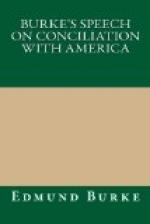Whilst every principle of authority and resistance
has been pushed, upon both sides, as far as it would
go, there is nothing so solid and certain, either
in reasoning or in practice, that has not been shaken.
Until very lately all authority in America seemed
to be nothing but an emanation from yours. Even,
the popular part of the Colony Constitution derived
all its activity and its first vital movement from
the pleasure of the Crown. We thought, Sir, that
the utmost which the discontented Colonies could do
was to disturb authority; we never dreamt they could
of themselves supply it—knowing in general
what an operose business it is to establish a government
absolutely new. But having, for our purposes
in this contention, resolved that none but an obedient
Assembly should sit, the humors of the people there,
finding all passage through the legal channel stopped,
with great violence broke out another way. Some
provinces have tried their experiment, as we have
tried ours; and theirs has succeeded. They have
formed a government sufficient for its purposes, without
the bustle of a revolution or the formality of an
election. Evident necessity and tacit consent
have done the business in an instant. So well
they have done it, that Lord Dunmore—the
account is among the fragments on your table—tells
you that the new institution is infinitely better
obeyed than the ancient government ever was in its
most fortunate periods. Obedience is what makes
government, and not the names by which it is called;
not the name of Governor, as formerly, or Committee,
as at present. This new government has originated
directly from the people, and was not transmitted
through any of the ordinary artificial media of a
positive constitution. It was not a manufacture
ready formed, and transmitted to them in that condition
from England. The evil arising from hence is this;
that the Colonists having once found the possibility
of enjoying the advantages of order in the midst of
a struggle for liberty, such struggles will not henceforward
seem so terrible to the settled and sober part of mankind
as they had appeared before the trial. Pursuing
the same plan [Footnote: 30] of punishing by
the denial of the exercise of government to still greater
lengths, we wholly abrogated the ancient government
of Massachusetts. We were confident that the
first feeling if not the very prospect, of anarchy
would instantly enforce a complete submission.
The experiment was tried. A new, strange, unexpected
face of things appeared. Anarchy is found tolerable.
A vast province has now subsisted, and subsisted in
a considerable degree of health and vigor for near
a twelvemonth, without Governor, without public Council,
without judges, without executive magistrates.
How long it will continue in this state, or what may
arise out of this unheard-of situation, how can the
wisest of us conjecture? Our late experience
has taught us that many of those fundamental principles,
formerly believed infallible, are either not of the




